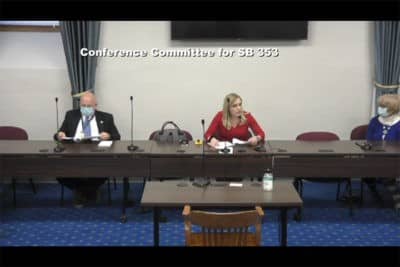
After dying in a conference committee in the final days of the 2021 session, an Indiana Senate bill that would limit the state’s authority to reschedule elections and tighten the application process for absentee ballots has been revived in 2022.
Senate Bill 329, again authored by Sen. Erin Houchin, R-Salem (above), was introduced Tuesday and assigned to the Senate Elections Committee. The bill is virtually identical to the Senate-passed version from last year; it later was heavily amended in the House and a conference committee failed to reconcile the two versions before the session recessed.
As introduced for 2022, the bill restores the Senate-passed provisions to limit the authority, as exercised by Gov. Eric Holcomb and the Indiana Election Division during the outbreak of the coronavirus pandemic in 2020, to change the “time, place or manner of holding an election’’—including the authority to loosen requirements for absentee voting—to the General Assembly only. Currently, the requirement to obtain an absentee ballot is to fill out an application and to meet certain criteria such as poor health or being out of the voting precinct at the time of the election.
The bill also contains a provision likened to one in Georgia legislation passed amid controversy last year. It would require additional documentation in applying for an absentee ballot.
After passing the Senate last year, the bill encountered resistance from leaders of the Indiana House, where the provisions involving rescheduling elections and affecting absentee voting were removed. Among those who testified against the Senate-passed bill in a House Committee hearing was an Eli Lilly and Co. vice president who said his employer believed that the legislation is a “solution in search of a problem” and “only serves to perpetuate the narrative that the outcome of the 2020 election was flawed or compromised.”— The Indiana Citizen